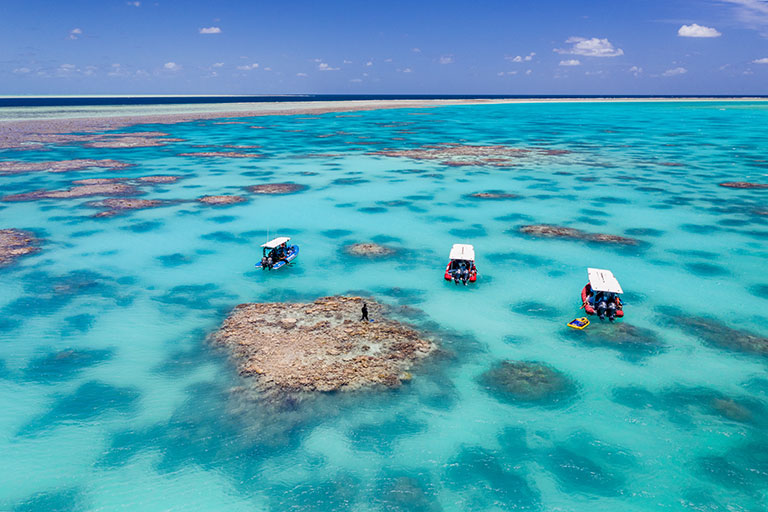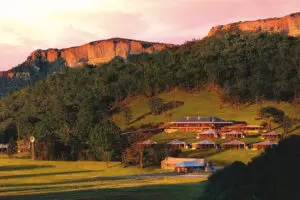The national carrier has already partnered with the foundation for 15 years, but the support announced today will go to a new Reef Restoration Fund.
The fund will train scientists, traditional owners and tourism operators in new coral restoration techniques. It will also support the Coral Nurture Program, which sees scientists and reef tour operators working together to add coral to various reef areas, and the Reef Restoration Adaptation Program which is innovating solutions to increase coral reefs’ resilience in the face of warming ocean temperatures, including deploying corals with higher heat tolerances. Financial support from Qantas will aid in the deployment of portable coral nurseries being developed by the Australian Institute of Marine Science, which can grow up to 100,000 new corals each year.
“Australia is the guardian of some of the most iconic coral reefs in the world,” said Great Barrier Reef Foundation managing director Anna Marsden. “It’s a huge responsibility and we’re proud to see one national icon supporting another.
“This partnership will help fund critical actions at a critical time.
“Coral reefs are the beating heart of our oceans. They’re a nursery and safe haven for a quarter of all marine life and support a billion people worldwide.
“But the Great Barrier Reef, and coral reefs around Australia and the world, cannot adapt fast enough to warming ocean temperatures, making them one of the most vulnerable ecosystems on the planet. We must help safeguard their future from the impacts of climate change.
“We’ve made more advances in coral reef restoration science in the past five years than we have in the past five decades. Over the life of the partnership we’re committed to finding opportunities to share these learnings with Australia’s other coral reefs.”
The Great Barrier Reef escaped being added to the list of World Heritage sites considered in danger last year, a decision that was met with relief in Cairns, which is a major gateway to the Great Barrier Reef and a conference and incentive hotspot. It’s status as a key incentive destination in particular, is due in large part to the Great Barrier Reef.
“Everyone’s ecstatic,” then head of the local convention bureau, Rosie Douglas, told micenet last year. “It was actually a really big concern [for] everybody.
“For us it’s really, really important that people visit the Great Barrier Reef and there’s a couple of reasons for that,” she told a wider group of attendees at the Cairns and Great Barrier Reef showcase last August.
“One is that every operator that goes out there also participates in reef monitoring…but also things like the crown-of-thorns [starfish] eradication as well – they keep an eye on the coral cover, looking at the changes in it and all of that data is actually fed back into the Great Barrier Reef marine park authority’s database [with] the federal government responsible for looking after it.
“If people don’t go to the Great Barrier Reef those vessels don’t operate and none of that reef monitoring happens.
“So, when people say, ‘oh I don’t want to visit Great Barrier Reef because I don’t want to harm it’, you’re actually doing the exact opposite.”
Tara Bennett has since taken over from Douglas as head of Business Events Cairns and Great Barrier Reef.
“Connecting our customers with natural landscapes is at the core of what we do, including carrying millions of people to the reef each year,” said Qantas Group’s chief sustainability officer, Andrew Parker, on the subject of today’s funding announcement.
“We know that aviation is a high emissions industry, which is why we were one of the first airlines globally to commit to net zero emissions by 2050,” said Parker.
“We want to take the same leadership in addressing our impact on nature so that future generations can enjoy all the opportunities that global travel offers for years to come.
“By establishing the Reef Restoration Fund with our trusted partner of 15 years, we’re helping accelerate the development of world-leading technologies and projects to restore some of our most critical ecosystems.
“It’s part of our commitment to address nature and biodiversity loss by reducing the impact of our operations and supply chain, supporting the broader restoration of nature and advocating for cross-sector transformation.
“These commitments are just the first step. We are also developing rigorous nature-related targets and plans on how we’ll achieve them, which we expect to release by the middle of next year.”




















